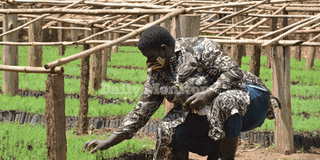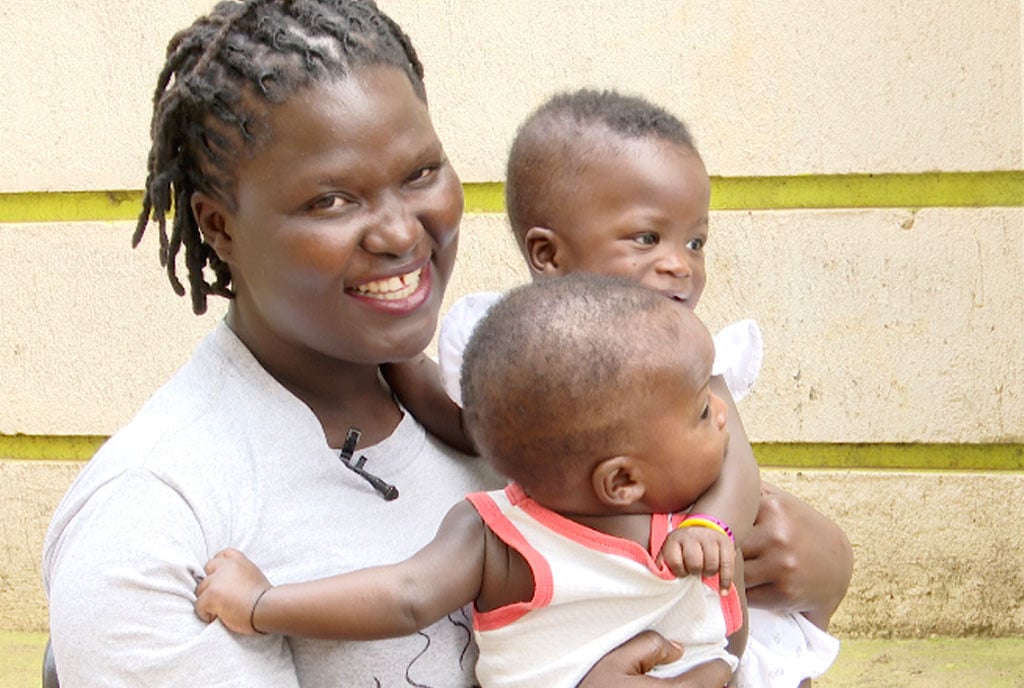Prime
Angole makes a fortune selling seedlings

Angole tends to her pine seedlings. PHOTO/SHABIBA NAKIRIGYA
What you need to know:
- On average, Dorcus Angole earns Shs600,000 a week from the sale of seedlings, the least of which costs Shs600. Angole plants eucalyptus, pine and muvule among others.
The difficulty of finding a job in Uganda has seen many people pursue the opportunities in agribusiness rather than spend years looking for employment.
One such person is Dorcus Angole. But unlike those who take up farming by chance, Angole has always been interested in agriculture as it has been her family’s mainstay.
Starting
Seeds of Gold found her tending to seedlings in a nursery bed on her farm in Hela Apeta village, Lira District.
Like many successful entrepreneurs, she started her business to fill a gap she saw in the market.
“After finishing my studies in 2019 and getting a diploma in forestry from the Nyabyeya Forestry College in Masindi, I decided to get into farming seedlings instead of waiting a year to get a job. I had come across farmers who were struggling to find specific fruit or vegetable seedlings, so I was confident I would have a market,” says Angole.
Research
She started researching how to roll out her idea armed with capital of Shs500,000 — from her savings and Shs100,000 from her parents — she was ready to get started. Today, the mother of three is the proprietor of Angole Seedlings and Nursery, a company that sells horticultural and other tree species seedlings.
In addition, she also harvests vegetables and fruits from her demonstration farms, which she sells to hotels and supermarkets.
Training other farmers
“Due to my experience and the training I got from Nyabyeya, I have become an expert in setting up tree nurseries, which I do free of charge. However, I charge a consultation fee,” she says.
Her firm has five employees — her brother is the director in charge of day-to-day operations, she is the marketing manager, and there are two agronomists and a casual labourer.
Angole’s market has grown by leaps and she now sells seedlings in the entire northern region, and gets both small and large-scale orders.
“Initially, it was a struggle to get the business off the ground. But today, our turnover is good thanks to the growth in the number of customers. People have learnt about my farm mostly through Facebook, our website where online bookings for seedlings are done and from referrals. I am earning a decent living from it,” says Angole.
“I have more than 10 different types of trees. But the ones with the highest demand are eucalyptus – E. grandis, E. urophylla and E. camaldulensis. Others that have demand include cypress (especially for fencing), casuarina, pine and grevillea. People also buy fruit tree seedlings such as grafted mangoes, avocados and oranges. However, I have introduced other species such as Moringa oleifera, Elgon teak and the Night tulip, among other indigenous species,” she says.
On average, she earns Shs600,000 a week from the sale of seedlings, whose prices start at Shs600. Angole plants eucalyptus, pine and muvule among others.
She also holds trainings on her farm once a month, which she publicises through posts on Facebook and texts to the contacts she has in her visitors’ book. She conducts the trainings together with other stakeholders in agribusiness.
Growing demand
And the demand for her services seems incessant. During the interview, she got several phone calls from clients asking about seedlings or wanting to have drip irrigation installations done. Is it ever too much?
“I am happy doing what I do. Farming allows me to manage my time, plan ahead and I get to meet people who advise and encourage me,” she says.
However, Angole warns that starting and running a business such as hers is not easy; it requires one to work hard, be available and establish a market for produce.
Angole started with a 5m by 10m nursery garden made with eucalyptus poles. “Our seedlings are disease resistant, grow vigorously, have uniform maturity and a long shelf life,” she says.
Ready market
“For now, I have a ready market, so I have no stale stock. And even if I have seedlings that do not sell, I can still grow them into mature fruit and vegetables for sale,” she says.
Advice
“If you are interested in agribusiness and your parents have land at home, do something on the farm and it will earn you some cash as you wait for your dream job,” says Angole. She adds that since people need to eat every day, farmers are unlikely to lack customers.
When Seeds of Gold asked what a prospectus farmer should do before setting up a nursery seedling farm, Angole says the most important thing is to find out what type of trees are marketable in a given area. Then identify the ideal site for setting up a nursery.
According to her, the best place should be along the main road so that motorists and other road users can see the seedlings. Then it must be closer to a source of water because tree seedlings need constant watering unless there is rainfall.
“Tap water is not ideal for watering the seedlings because it is usually chlorinated; the chemical is not friendly to trees. One should also have a water storage tank, a generator to pump water into the tank, access to top soil and sand and organic manure. Tools to have include hoes, watering cans, wheelbarrow and rakes. Also, get quality seeds from recognised institutions,” says Angole.
Most importantly, the site must have a toilet or a latrine, a store and an office for keeping records, she says.
Her plans for the future?
“In five years’ time, I see myself owning a large plot of land, about 10 acres, where I will expand to include greenhouse technology and carry out intensive farming,” she says.
Challenges
“There are pests one has to deal with such as termites and crickets, which feed on the trees. But I keep on managing them using appropriate pesticides.
The other challenge is that animals feed on the tree seedlings, especially if the nursery is not manned,” says Angole. Angole is also faced with lack of sufficient water to irrigate her seedlings.




